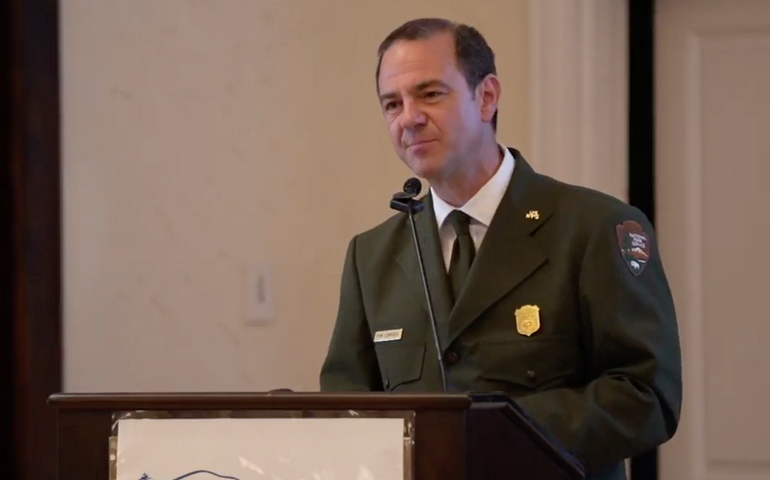Acadia’s fundraising partner launches $10M campaign to build employee housing
 Screenshot / Courtesy Friends of Acadia
Speaking at Friends of Acadia’s annual meeting Wednesday, Acadia National Park Superintendent Kevin Schneider said lack of housing has been a barrier to hiring.
Screenshot / Courtesy Friends of Acadia
Speaking at Friends of Acadia’s annual meeting Wednesday, Acadia National Park Superintendent Kevin Schneider said lack of housing has been a barrier to hiring.
Friends of Acadia, the fundraising partner for Acadia National Park, this week announced a $10 million capital campaign to address a severe shortage of housing for seasonal park employees.
The nonprofit raised $7.5 million during the quiet phase of the “Raise the Roof” campaign, highlighted at the organization's annual meeting on July 10.
“We still have $2.5 million to go to achieve our goal of $10 million,” said Bill Eacho, chair of the Friends’ board of directors. The goal is to reach the campaign goal by the end of this year.
The campaign is expected to leverage another $10 million or more in matching funds from federal and other sources.
“Seasonal employee housing is critical to our workforce,” said Kevin Schneider, Acadia’s superintendent.
The National Park Service and Friends of Acadia have identified two suitable sites on park-owned land that could provide housing for 60-plus seasonal employees: the Harden Farm property in Bar Harbor and the Dane Farm property in Seal Harbor, according to a news release.
Because only the National Park Service can build on park land, the projects won’t compete for building lots with other workforce housing efforts.
Friends of Acadia’s overall housing strategy is to add at least 130 beds for seasonal workforce housing for Acadia and its partners.
The park needs 150 seasonal employees and was able to hire only 115 the past couple of years, partly due to the lack of seasonal housing, leaving 30% of seasonal positions unfilled, Schneider said.
In 2023, only eight of 36 seasonal positions on the trails and carriage roads were filled.
Building on earlier efforts
The campaign builds on Friends of Acadia’s work to date to supply housing.
Last year, the group bought a four-acre parcel called Dane Farm, in a Mount Desert Island village called Seal Harbor, in order to develop housing for seasonal employees of Acadia.
A $3.3 million construction project is well underway there on two residential units totaling eight bedrooms. When completed, Friends of Acadia will donate the structures and property to the park, and seasonal employees are expected to be living there by the spring of 2025.
Also last year, the group bought a 10-bedroom inn in Southwest Harbor for Acadia’s seasonal employees.
Ten seasonal workers are now living at the inn.
The larger Harden Farm property is already home to eight existing housing units and has been identified as a location for the expansion of workforce housing since 1969. The property would provide a planned 50 to 60 additional beds for seasonal workers in two phases of construction. The National Park Service is leading project design and development and the goal is to begin phase one construction at Harden Farm later this year.
Earlier this month, Friends of Acadia announced it bought 18 acres at 39 Jordan River Road in Trenton, which includes six townhouses that will be used as housing for Island Explorer bus drivers beginning in 2025.
The Island Explorer is a key seasonal transit service throughout Acadia and Mount Desert Island.
In recent years, Downeast Transportation, which runs the Island Explorer, has aimed to hire about 120 seasonal bus drivers. But for the last couple of years, it’s had a shortage of between 25 and 40 drivers.
The property also includes undeveloped land that the Friends said offers expansion opportunities for additional workforce housing for Acadia and its partners.
A larger problem
Schneider said he recently fielded an interview with an employee candidate who wanted to know if employee housing was available.
“The answer was no,” Schneider related. “The position remains unfilled.”
He continued, “Finding housing is impossible for our seasonal workforce and it’s becoming a deal-breaker for our year-round workforce.”
A recent study found that two-thirds of Acadia’s workforce couldn’t afford to buy a home within a 60-minute drive of park headquarters, Schneider said.
“Adding housing is Acadia’s single most important priority,” he said.
Although the shortage of seasonal workers in recent years is partly due to the labor market, “housing is fundamentally a major barrier,” he said.
National parks across the nation are experiencing a housing crisis, Friends have said.
Schneider credited Friends of Acadia for progress in tackling the issue over the past year, including its work to push the National Park Service’s headquarters in Washington, D.C., to make housing a national priority.
“That work is getting noticed,” said Schneider, who said that other national parks have contacted him to learn about the past year’s housing initiatives.














0 Comments